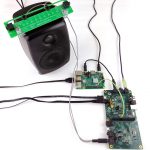New solution uses machine learning to protect against botnet attacks

The Mirai botnet is thought to have affected more than 1.5 million smart devices over the past few months.
Router manufacturer Securefi is aiming to combat this problem with the launch of a new IoT device security service. Initially available for the company's Almond 3 routers, Securifi's solution protects connected home devices like DVRs, IP cameras, and smart thermostats from a number of key online threats.
Three in four businesses collect IoT data

It looks like 2017 will be a great year for Internet of things industry. 451 Research's new report says that almost three quarters of all businesses worldwide, 71 percent of them to be exact, are gathering IoT data today.
The report is based on a survey of 1,000 organizations, scattered all over the globe. The best part about this figure is that it represents a three percent jump compared to its last report, which was released a quarter ago.
Internet of Things risks and what to do about them

In the past year we’ve already seen the Internet of Things used to carry out cyber attacks, and many experts are predicting that this is a problem that will grow in coming months.
Given that many people may have acquired new IoT devices over the holiday period, financial advice website RefiGuide has put together a timely infographic looking at the risks IoT devices can pose and what you can do to protect yourself.
Changing infrastructure and new job roles among 2017 Internet of Things predictions

Continuing our series of expert predictions for the coming year, today we turn our attention to the Internet of Things which has begun to take off in a serious way in 2016.
Although the IoT may already be pretty big it's set to get much, much bigger. Figures earlier this year from Machina Research predict the number of IoT connections will grow from 6 billion in 2015 to 27 billion in 2025. So what opportunities and challenges is this going to present to businesses?
What's next for AI in 2017?

In the sci-fi film Ex Machina, reclusive inventor Nathan Bateman foresees a bleak future, telling the movie's protagonist, Caleb, that "One day the AIs are going to look back on us the same way we look at fossil skeletons on the plains of Africa".
When we don’t understand something, we tend to fear it; which is one reason popular movies like Ex Machina and HBO’s nail-biting new series Westworld like to imagine futures in which artificial intelligence plots to destroy humanity.
The three secrets to successfully monetizing IoT data

The global business landscape is being transformed by the Internet of Things. Soon, every business will be an IoT business simply because those that don’t adapt, innovate, and transform their models will risk falling behind in the Connected Economy. But even as business leaders scramble headlong to get in on the IoT gold rush, many are faced with the same harsh realization: that actually monetizing IoT data is difficult.
I’ve written about the challenges of IoT monetization before, and I agree with Gartner’s assessment that 80 percent of IoT implementations will squander their transformational opportunities. This statistic isn’t due to a lack of opportunity, as I believe that for any company that has customers, suppliers, employees or assets, IoT monetization can be transformational. Here are my top three strategies for ensuring that your IoT initiative is part of the 20 percent that actually succeed.
Businesses believe IoT can drive customer engagement

Every fifth business is planning on adopting the Internet of things (IoT) to help address customer demand, and improve engagement. This is according to a new report by analytics firm SAS.
These companies are mostly focused on improving front-end processes and efficiency. Only after tackling these issues will they focus on internal processes.
Three security trends that will take off in 2017

Cybersecurity, the Internet of things, driverless cars, artificial intelligence. These topics were hot in 2016, and interest in them should continue strong in 2017. However, the discussions will take new turns. Where will they go?
I predict that three particular trends will gain real momentum and re-shape the cyber landscape in 2017.
6 IoT devices you may not have considered

The Internet of Things, or IoT, seems to be the big headline in tech news lately.
Perhaps you’ve heard of smart remotes, outlets, thermostats or alarm systems, but with all the recent development in this area, there are probably quite a few devices that you haven’t yet considered. Here are six worth adding to your tech radar.
Conexant and Amazon bring Alexa to Raspberry Pi with 'AudioSmart 2-mic Development Kit'

Amazon's Echo devices are incredible. I'll admit that I was a skeptic at first, but once I got my own, I was hooked. Not only can the Alexa voice assistant provide me with important data like weather, news, and traffic, but it can play music too. Most importantly, it serves as a brilliant IoT control unit. My house has several WiFi connected power outlets, and I can verbally tell Alexa to turn off my lamps. It can even control my television!
Much of Amazon's success with Echo and Alexa is thanks to third-party developers and hardware. Today, Conexant and Amazon announce the AudioSmart 2-mic Development Kit. This add-on for the Raspberry Pi should enable easier development of devices using Amazon's Alexa voice technology. This could ultimately lead to further growth and adoption of the Alexa voice assistant.
The big security problems in 2017

If there’s one thing you can say with certainty about cyber-security in 2017, it’s that many companies are going to fail because they are simply not doing the right thing. Fundamental flaws still exist.
Until the technical people lift their heads up and see that security and business are different sides of the same coin, we will inevitably see more damaging attacks. When security people learn to speak in the language of business they will begin to understand just where in the organization they need to apply their expertise.
Vivaldi embraces IoT with support for Philips Hue lights, adds multiple tab selection

Vivaldi Technologies -- led by Opera co-founder Jon S von Tetzchner -- has released Vivaldi 1.5, the latest version of its customizable web browser for Windows, Mac and Linux.
The big talking point in version 1.5 is Vivaldi’s integration into the Philips Hue IoT ecosystem, but the new release also adds a number of more universal features, such as support for tab drag and drop, which makes tab stacking much simpler than before.
Saving the Internet of Things (IoT)

This is my promised column on data security and the Internet of Things (IoT). The recent Dyn DDoS attack showed the IoT is going to be a huge problem as networked devices like webcams are turned into zombie hoards. Fortunately I think I may have a solution to the problem. Really.
I’m an idiot today, but back in the early 1990’s I ran a startup that built one of the Internet’s earliest Content Distribution Networks (CDN), only we didn’t call it that because the term had not yet been invented. Unlike the CDNs of today, ours wasn’t about video, it was about the daily electronic delivery of PDF editions of newspapers and magazines. Canon told us that if the New York Times, say, would make a PDF version of its daily paper, the Japanese company would give an ink jet printer to every electronic subscriber, making their money solely on replacement ink cartridge sales. Communication would be between the CDN and printer with no PC involved. It was effectively an Internet of Things, circa 1994. Obviously, we failed, but learned a lot along the way.
Samsung buys Harman for $8bn

In an effort to expand into the auto market, Samsung has announced that it will purchase Harman for $8 billion to gain access to both its automotive and audio offerings.
The American company Harman is best known for its audio equipment, though it also has a large presence in the automotive market. Last year, the company earned over $7 billion, of which its connected car devices and audio systems accounted for 65 percent of the total sales.
Comodo launches new certificate management platform

Digital certificates are an essential part of online security and as the number of Internet of things devices continues to grow they'll become more important still. But as we rely more on certificates so managing them becomes more complex.
Cyber security solutions company Comodo, the world's leading certificate authority, is launching the latest release of its Comodo Certificate Manager (CCM), a full-lifecycle digital certificate management platform which makes it easier for enterprises to manage their certificates.
Recent Headlines
BetaNews, your source for breaking tech news, reviews, and in-depth reporting since 1998.
Regional iGaming Content
© 1998-2025 BetaNews, Inc. All Rights Reserved. About Us - Privacy Policy - Cookie Policy - Sitemap.